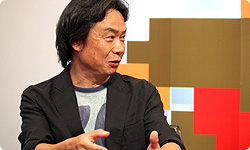6. Keeping It Simple
One thing I’m careful about is not becoming exhaustive.
Oh?
When we’re discussing options A and B, someone will say, “There’s also F!” Then the guy who’s obsessed with working hard will say there’s C and D and E and F and G, like we’re trying to line up every possible option. But when it comes to actually producing something worthwhile, sometimes it’s more fun when we only had A and B to work with. Of course turning up countless possibilities, like Google, is something different entirely.
Yeah, I agree.
Your work isn’t exhaustive, is it?
No.
For example, when it comes to a famous character like Mario - I know there were technical limitations like the number of pixels that could be used for him - but for the sake of being exhaustive, shouldn’t you have come up with other designs besides a middle-aged man with a moustache? I mean, it’s a game that kids will play, and you ended up with a middle-age guy with a moustache.
Yeah. (laughs) When I came up with Mario, I probably drew up one other option. A rough sketch. In pencil.
So... options A and B. (laughs)
Yeah, I didn’t have any ulterior motives, such as to draw an alternative just to make the one I liked look better in the end, I just ended up drawing two somehow. After all, at that time, I was making the artwork and plans practically all by myself and only after everything was all finished would we ask, “How are we going to sell this?” In other words, no one checked my work. The programmer was happy if I just drew something and took it to him.
So you just polished up option A.
Yeah. But we were making the software for the NES back then, so there were also capacity limits.
Oh, right.
Having said that, however, even when we are facing such limitations as capacity constraints, if anything bothers me, I would really apply myself to it. For example, deciding to have Mario enter a Warp Pipe from the top. Having him cross in front of it from the side wouldn’t work.
Oh, I see.
And you know how you suddenly go underground after you clear World 1-1?
Yeah.
I thought it was strange how Mario was already standing there underground when that level begins. Why is Mario, who just passed in front of a castle, standing underground? I couldn’t fit in a sequence showing him falling underground, so I decided to have him just plop down from the top of the screen, and - surprisingly - that was just fine. If someone had said, “You should provide a little more detail here,” it would have turned out differently.
In other words, there used to be more constraints, so you had to focus on what was most important and think simply.

Yes, I really think so. The restrictions were often a big help. Players were able to imagine the details that weren’t put in.
In terms of the alphabet, you only had to worry about options A and B. Kids today, who can’t return to the days when there were only a couple of options, may have to labour in ways we never did.
That’s right. I feel a little bad for them.
Earlier we talked about how a man and woman getting ready to be married can reduce the various decisions facing them to whether they will or won’t get married, which is just like returning to a simple choice between A and B.
That’s right.
You have to get used to thinking about how you can do something easily. That’s a completely different approach to saying, “I’ll work hard at it!”
And, for example, how many titles we would come out with each year used to be a simple matter. It was something like two games a year, and if we didn’t put those out, we wouldn’t make any money.
Ah, I see.
We instinctively understood what it would mean if we didn’t bring out at least one game for the year-end shopping season. When that’s the case, you have no choice but to say, “Let’s get a game out!” and simply decide your priorities.
Yes. In order to be on time.
Right. Then it gradually became 10 games per year, then 20, and when you start handling multiple games, the reality of it begins to disappear. Then you start thinking about all sorts of other stuff.
You stop pulling together behind that positive rallying cry of “Let’s get a game out!”
Right. That might have happened to me too, but I managed to get past that. You know, I joined the management team. Then things got simple again.
Aha, I see…
When you’re in management, you understand clearly what will happen if you don’t bring out enough titles at the end of the year.
Right.
The more you see things from a managerial point of view, the more you’re able to think about things simply.
Isn’t that quite a big discovery?
It just might be! (laughs)
Yeah. People often say you’ve got to adopt an executive’s viewpoint, and that when you realise you’re the one who’s running the company, then you begin to see the problems involved in it. In other words, thinking like management makes problems simpler.
I think so. That’s why for about ten years I’ve been keeping things simple. But the staff goes in a direction that's more complicated. That difference is interesting. Something I’d like to say, though - to avoid misunderstanding - is that a company is, in effect, supported by those complicated people.

Uh-huh…
I truly do understand that. But something I’ve been pondering for a while now is how I can, in full understanding of that, make those people do things simply. My work for several years has been explaining, with all my might, to those people that it is also necessary to think simply sometimes. To be honest, though, I think I myself still have both attitudes. (laughs)
Yes, I can see that.
(laughs)
